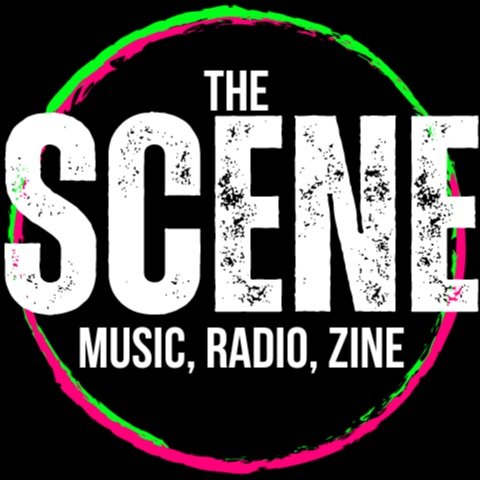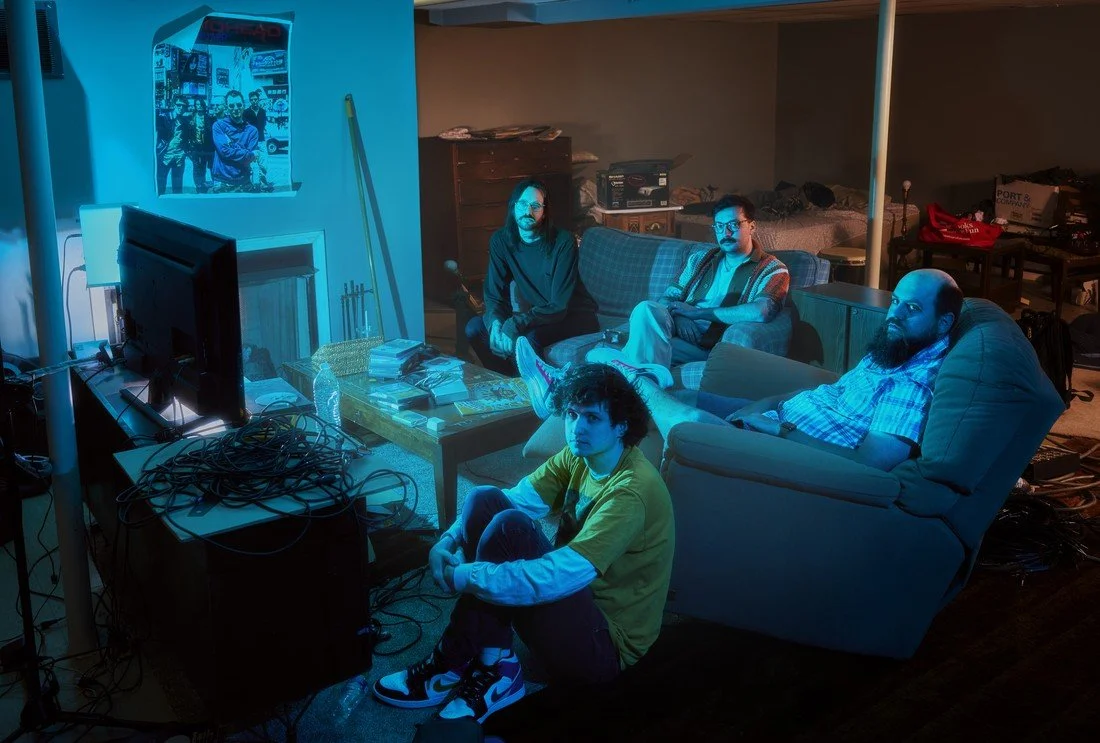Interview: Goings
Goings by Jesse
Goings, the Philadelphia-based math-pop band, has been carving a unique space in the emo and indie rock scene with their inventive fusion of glitchy synths, intricate guitar work, and emotionally charged lyrics. Founded by Chris Kearney, Keith Rogers, and Aidan Rogers, the group faced a transformative moment during the pandemic, leading to the addition of guitarists Cam Chung and Alexi Peters. This lineup shift ignited a fresh creative drive, culminating in their brilliant sophomore album Memory Card.
Known for balancing technical complexity with catchy melodies, Goings blends math-rock influences with pop sensibility, creating a sound that’s both adventurous and accessible. Tracks like “I’m Talking” showcase the band's ability to layer intricate rhythms with soaring harmonies while exploring themes of self-reflection, frustration, and growth.
In this Q&A, Goings discuss the collaborative process behind Memory Card, the impact of new members on their evolving sound, and the cathartic role their music plays for both themselves and their listeners.
With the release of your new album Memory Card earlier this month, how does its sound and thematic direction differ from your debut album It’s For You?
Aidan: The new record leans even more heavily into our unified approach to writing as a band, which we think is really the spirit of Goings. Songs that are primarily led by mine or Keith’s lyrics never feel like they are defined by the vocals, but are made complete by the rest of the band through both vocal harmonies or distinct instrumentals. This has been a key aspect of the Goings ethos since day one, but it really shines through on Memory Card.
Keith: I think you can really hear the band mature in a big way. Every aspect of each song is more fleshed out and defined. If It’s For You sets the foundation for our sound, Memory Card takes that raw foundation and improves upon it. Lyrically, I find myself in a much more introspective place yet still being pleasantly vague. Instrumentally, I feel like we’ve all stepped up our game yet remain tasteful. Sometimes riffy, mathy stuff can be too much for me, but I think we hit a real nice sweet spot.
Can you share the inspiration behind the album title Memory Card? Is there a deeper narrative or concept that ties into the music?
Aidan: We were drawn to Memory Card as a title because it represents an object by which the past can be overwritten, modified, or deleted. When Keith and I spoke about themes that were emerging in these songs, I remember talking about how memories never change. It’s our perspective on them that is changed. Most of these songs reflect some defining moment in how we want to look back on something. There’s Tongue Twister which is about finding hope despite a missed opportunity, or Pretty as a River, which is a story about the realization that we don’t truly understand our present moment until it’s gone. There are threads of this theme across the entire record.
Your debut album came out just before the pandemic hit, which must have been a huge challenge. How did the experience of lockdowns and live show cancellations impact the creation of Memory Card?
Aidan: It was a huge bummer not being able to celebrate our first record with a release show because of lockdown, but we were really lucky to still have gained a small following despite that. Coming out of lockdown with two new guitarists definitely encouraged us to take our time with the writing process. Goings rarely scraps songs, but this time we really refined the record down to the tracks we knew were essential to the sound we wanted.
How has your approach to songwriting evolved from It’s For You to Memory Card? Were there any new techniques or processes you explored this time around?
Aidan: This is the first release with Cam and Alexi on guitar. Their playing is so distinct that I think you can hear how our sound has evolved through the guitars alone! As for the writing process, more of these songs were born and developed during practice and writing sessions compared to those on It’s For You, where many of the songs on that record were written independently to start. Memory Card also has a stronger emphasis on the synth and keys. With the addition of a Rhodes, I was able to go in completely new directions for songs like Pretty as a River and You’re Gonna Die Someday. I also think the lead synth tones on my Minilogue are more bold and confident compared to It’s For You. I basically didn’t know how to play a synthesizer when we started this band. I’ve come a long way since we started back in 2019!
The addition of Alexi Peters and Cam Chung seems to have brought new energy to the band. How have they influenced your sound?
Aidan: These guys are so creative that it’s scary! The amazing thing about their dynamic on guitar is how fluid the roles of “lead” and “rhythm” are. I listen to a song like Tongue Twister and marvel at how interconnected and complimentary the two guitar parts are. Aside from their playing, I think I underestimated how new personalities can entirely shift how writing and practice operates. Cam has sharp taste and tends to really trust his ear when making musical decisions, while Alexi is probably the most cooperative and selfless musician I’ve ever played with.
Philadelphia has a vibrant music scene with bands like Carly Cosgrove, Sweet Pill, and Kaonashi. How has being part of this community shaped your growth as a band?
Aidan: The kindness and creativity of our scene never ceases to amaze me. As a band, you need to be around other bands that are pushing themselves creatively while never losing the joy that music brings. It’s amazing to have gone from playing house shows with many members of the bands you mentioned to seeing their success now. It feels really good to be able to feel so close to the bands around us while going in directions completely independent of one another.
Keith: Who is Sweet Pill?
The DIY ethic is a huge part of Philadelphia’s music scene, with community-driven events and venues. What role does that DIY ethos play in Goings' identity as a band?
Aidan: the DIY spirit makes being a band all about the music, not the space or equipment. It’s fun going from playing a serious venue one day to a house show the next, and both are awesome! But it goes beyond music. In Philly, you don’t have to go far to find artists to collaborate with for music videos, posters, photography, merch designs, etc. Across the board, there’s so much support for bands, but bands are also vital to helping other DIY artists as well! We’ve worked with dozens of filmmakers, visual artists, and photographers, most of whom were friends made at shows within the Philly scene!
The synths play a huge role in shaping your sound, especially on tracks like "I’m Talking." How do you integrate synthesizers in a way that complements the guitars and bass without overshadowing them?
Aidan: My goal is to create sounds that are ear-catching and new to the listener. “I’m Talking” is a good example. I love how percussive and intense that synth patch is, but you wouldn’t want an entire song made of just that. The synths often point us in a new direction, but the guitars and drums do the heavy lifting. Sometimes having a synth feels like a cheat code for making songs that have an entirely new feeling to them.
You’ve described your sound as “math-pop.” Can you explain what that genre means to you, and how you balance technical complexity with catchy melodies?
Aidan: As much as we love complexity and technical skill, we never want to pursue these things for their own sake. We like to use math-rock elements as a songwriting tool, instead of it being our foundation. Math-pop is our cheeky way of describing music that is catchy, but intricate and often incorporates time signature changes. My favorite example on Memory Card is in “You’re Gonna Die Someday” when we abruptly shift to a ⅞ groove in the bridge. We want this to be ear-catching but not jarring or flashy, and the change to an upbeat and jaunty rhythm matches the song’s theme of embracing something that is otherwise sad. A change in perspective.
Keith: It’s funny, I think this album is abundant with hooks but not so many of your standard choruses. Our common inspiration at the beginning of the group was mathy bands like TTNG. Over time we’ve tried to make a more diverse sound, but I think that foundation will always be there.
You’ve cited influences from a variety of genres, including emo, synth-pop, and math-rock. What are some of the musical inspirations that shaped the eclectic sound of Memory Card?
Keith: I can list every band or artist that each member takes influence from on this record but that seems like a drag. The eclectic sound comes from our very unique and collaborative writing style. While we do have musical tastes in common, we seem to reach for sounds of differing tastes as often as similar ones. I view us all as songwriters. We all carry our weight equally, yet differently.
Cam: I think our unique sound is a bit of a happy accident. We have such varied inspirations: from 60’s pop to modern ambient, from huge bands like Death Cab to local bands we met in basements, that it’s hard to come away with songs that sound too much like any one inspiration. We often have a very “yes: and” dynamic in the band, building off each other's ideas.
Both “I’m Talking” and “(Subtitles)” feel emotionally charged and cathartic. How important is it for your music to serve as an outlet for emotional release, both for yourselves and your listeners?
Aidan: It’s very important! I like that you bring up those two songs because they each have really bombastic elements. They’re songs I hope someone might put on if they just want to feel something, and we want to encourage that with our high-energy instrumentals. The lyrics provide another layer of catharsis for myself, Keith, and, I hope, the listener. While the lyrics are inherently personal, I also think that we write in such a way that it can be personal for the listener as well. I can’t go into detail about every song, but “I’m Talking” is essentially about calling yourself out on your own bullshit. I hope those lyrics can further enhance how the song feels.
Keith: Absolutely! I really hope listeners can relate and get something out of the lyrical content. For me, writing this album was extremely cathartic. I was going through a pretty rough breakup at the time of writing most of these songs. The
songs were written before, during, and after that experience, and I think that comes across. The songs to me are about coping with my harsh new realities and trying to pick up the pieces. Goings never leans too negative. Although we can dig into the darkness, we always seem to find a positive outlook in the end.
With a new album and new members, what excites you most about the future of Goings, both creatively and in terms of live shows?
Keith: I think we’re all just excited to play these new songs live. Even though this is a new album, we’ve had these songs in the can for a while. Cam and Alexi are technically the newest members but they’ve been with us now longer than our previous guitarists. We’d throw in a new song here and there at a live show
before any of these songs were even released so it’s just nice for them to be out there.
Cam: I’m real excited to have our first complete full-length out as a band of these five people. I hope people are as excited about this new evolution of Goings’ sound as I am. Most of all I’m looking forward to us all writing again because that’s where the Goings magic really shines through.
What do you hope listeners take away from Memory Card when they listen to it for the first time?
Keith: I hope that it comes across that these songs are a labor of love. Goings has been through a lot in the past two years writing and recording these tracks. At the end of the day, I think our music reflects our friendship, emotion, and hard work.
Cam: I hope each song has a strong presence and identity on the record upon first listen, and I hope the listener notices more and more intricacies and layers as they re-listen over time
What has everyone in the band been listening to lately? Any new or old favourites that have been on repeat?
Aidan: I’m obsessed with Spirit of the Beehive’s new record.
Keith: I’ve been loving the new Illuminati Hotties album POWER and have been jamming some Oasis since the reunion announcement. Aidan and I have been listening to the newest Chris Cohen album a lot lately as well.
Cam: I’ve been loving the new Foxing self-titled record. Those guys know how to experiment with their sound in so many ways while holding a core identity which is very inspiring to me. I’ve also really been appreciating both the art of writing a quality pop song and curating an artist's persona thanks to Chappell Roan.
Chris: I’ve been listening to the new Goings album, Memory Card, a lot.
Alexi: Nothin new for my usual listening habits. Some Pedro the Lion, some Still Woozy, Lord Huron and Briston Maroney. I'm bouncing around my usual go-to’s these days. The new Young Statues single rips too!
Finally, Chris how did you manage to get the @drumming Instagram handle
Chris: It all started when I got my 2nd gen iPod touch in 2009 and created all my social media accounts. I was a 14-year-old 8th grader with too much time on my hands. Those were the days of Doodle Jump, Tap Tap Revolution, and jailbreaking of course!
Memory Card from Goings is out now and available on all good streaming platforms.








































